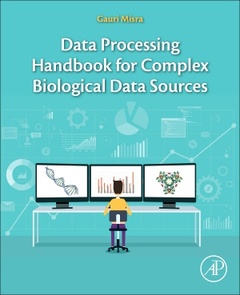Description
Data Processing Handbook for Complex Biological Data Sources
Coordinator: Misra Gauri
Language: English
Subjects for Data Processing Handbook for Complex Biological Data Sources:
Keywords
1D NMR; 2D NMR; AFM; Apoptosis; Bioimaging; Biomolecular asymmetry; Biomolecular interactions; Cell cycle; Chemical bonding; Chemical shift; Circular dichroism; Confocal; DNA-seq; Data analysis; Data interpretation; Determination of thermodynamic parameters; Differential gene expression analysis; Drug design; Enthalpy; Entropy; FRET; Flow cytometry; Fluorescence emission; Fluorescence polarization; Fluorescence spectra; Graphene oxide; IR spectroscopy; Immunophenotyping; Iron nanoparticles; Isothermal titration calorimetry; Mass interpretation; Mass spectrum; Melting temperature; Metagenome; Metagenomics; Metagenomics interpretations; Microbiome; Microscopy; NGS quality control; NMR spectrum acquisition; Nuclear magnetic resonance; Orbitrap technology; PeptideProphet; Phosphoprotein; Plane polarized light; Proliferation; Protein; Protein stability; Protein structure; Protein–ligand binding; Protein–protein interactions; RNA-seq; SEM; SSU rRNA gene; Secondary structure; Sequence pipelines; TEM; TPP; Tertiary structure; Thermodynamics; Variant calling; Vibrational frequency
188 p. · 19x23.3 cm · Paperback
Description
/li>Contents
/li>Readership
/li>Biography
/li>Comment
/li>
Data Processing Handbook for Complex Biological Data provides relevant and to the point content for those who need to understand the different types of biological data and the techniques to process and interpret them. The book includes feedback the editor received from students studying at both undergraduate and graduate levels, and from her peers. In order to succeed in data processing for biological data sources, it is necessary to master the type of data and general methods and tools for modern data processing. For instance, many labs follow the path of interdisciplinary studies and get their data validated by several methods.
Researchers at those labs may not perform all the techniques themselves, but either in collaboration or through outsourcing, they make use of a range of them, because, in the absence of cross validation using different techniques, the chances for acceptance of an article for publication in high profile journals is weakened.
1. Mass spectroscopy2. Circular Dichroism3. Fluorescence4. Higher throughput sequencing5. Nuclear Magnetic Resonance6. Infrared spectroscopy7. Microscopy8. Flow cytometry
Primary: Bioinformaticians; graduate students on health informatics
Secondary: Researchers from diverse biological background in need of processing data
- Explains how to interpret enormous amounts of data generated using several experimental approaches in simple terms, thus relating biology and physics at the atomic level
- Presents sample data files and explains the usage of equations and web servers cited in research articles to extract useful information from their own biological data
- Discusses, in detail, raw data files, data processing strategies, and the web based sources relevant for data processing

